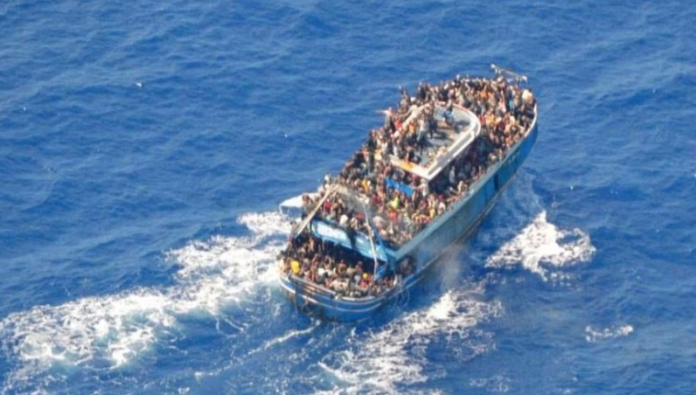—— Pakistani survivor recalls the tragic memories
—— Claims the boat was targeted by the Greece Navy
—— Says the Greece Navy kept watching migrants sinking and dying
DM Monitoring
GUJRAT: A Pakistani survivor from Gujrat, Usman Siddiq, blamed the Greece navy for sinking the boat leading to one of the worst mi-grant boat dis-asters.
A survivor Usman Siddiq made startling revelations about the Greece boat tragedy. Siddiq was one of the lucky passengers who safely reached home.
The 28-year-old survivor alleged that the Greece navy deliberately sank the boat loaded with hundreds of migrants. Siddiq is a resident of Kaleki – a sub-urban area of Punjab’s Gujrat district – and was working as a police constable.
He told media that he wanted to reach Italy along with his four friends for a better future. “I had paid Rs2.4 million to a travel agent namely Asif Sanyara. Some Egyptian youths were driving the boat who had been trained by the agents.”
Siddiq claimed that the migrant boat was deliberately neglected in Italy and Greece. “The Greece navy deliberately sank our boat at 11:00 pm. From night to morning, the Greece naval ship kept watching the sinking migrant ship as a silent spectator.” “All passengers of the migrant boat were starving for at least three days. Two youths had died in the boat due to starvation and suffocation.”
Usman Siddiq revealed that some youths are still present with the agents namely Asif and Munawar Sanyara in Libya. Four people who survived the mi-grant boat disaster off the coast of Greece alleged that the actions of the Greek coastguard were responsible for the sinking of the overcrowded fishing vessel.
The boat, carrying an estimated 750 individuals primarily from Pakistan, Syria, and Egypt, capsized on 14 June, resulting in one of the most devas-tating hu-manitarian disasters in the Mediterranean region in recent years. Out of the total number of passengers, 104 managed to survive, while the bodies of 82 victims have been recovered.
According to international media outlets, some of the individuals who shared their experience with the BBC are being held at the Malakasa refugee reception centre, located approximately 40km (25 miles) northeast of Athens, the capital of Greece.
“We thought they [the Greek coastguard] would rescue us but instead they sank the boat,” an Egyptian survivor told us.
He said the Greek coastguard was towing the vessel when it sank in one of the deepest parts of the Mediterranean, about 80km (50 miles) off the coast of Greece.
The Greek authorities have previously denied this, claiming that when they tried to tie a rope to the boat to come aboard and assess the situation, people on board tried to remove it, saying they wanted to travel to Italy.
But a Syrian survivor told us: “They towed the boat from the side and moved with speed.” This tallies with the account of the Egyptian man, who said the coastguard “forcibly pulled us, causing the trawler to capsize”.
Some of the survivors we spoke to said the Greek authorities asked them not to speak to the media about how the Greek coastguard tried to “rescue the boat” and if they did speak to reporters they “shouldn’t blame the Greek coastguard”.
One said Greek officials put pressure on him to change his account of what happened and in return he would “get some financial aid and our appli-cation for refugee status would be expedited”.
We put the survivors’ accounts of what happened to the Greek authorities and asked for a response, but they said they could not comment because any in-formation they have forms part of the official investigation into the sinking.
They also pointed us to their previous statements which said they did not tow the trawler and repeated offers of help were turned down.



